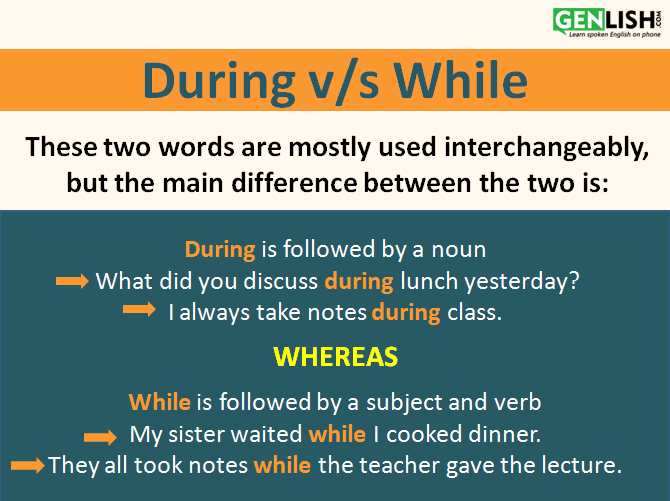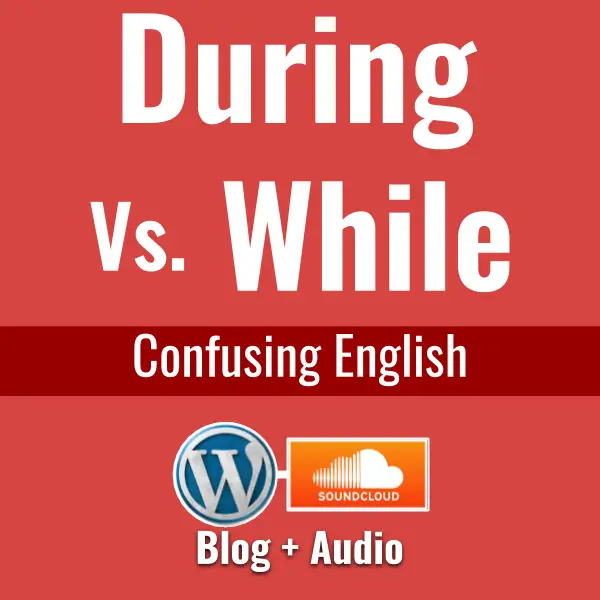
DURING and WHILE What's the Difference Between During vs. While ESLBUZZ
During vs. While. "When", "during", and "while" all have the same meaning, but they are used in different ways and follow different grammar rules. We use all three of these to say that some action or event happens at the same time as another action or event. 1. During. Use "during + noun". We can use this at the beginning or end.

Difference Between DURING, FOR, WHILE English Study Here
Notice that during is followed by a noun, which often represents an activity ( during + the film ). While is used to refer to a background period of time in which another activity happened. It is very similar to during, but it is followed by a sentence ( while + subject + verb. ), so they are not interchangeable. Example 2:

During vs While Difference Between During and While 7 E S L
"During" is a preposition used to indicate a period or range of time in which something happens, emphasizing the duration of an event. For example, "during the summer," highlights the entire summer period. Conversely, "while" is a conjunction that links two events occurring at the same time, focusing more on the parallel nature of these events.

DURING vs. WHILE English Grammar Lesson Happy English Free English Lessons
The word while is a subordinating conjunction (like the word because or if ); it begins a subordinate clause. You need to put a subject and a verb after while to make a sentence, for example: While she studied, he watched TV. That's it. You can see that the words can be used in a similar way, but the grammar is different.

During vs. While (English Grammar) YouTube
Both while and during are words that are used to indicate time. They both indicate two actions or events happening at the same time. However, there is a difference between while and during based on their grammatical category and usage. While is a conjunction, which is used to connect two clauses together. During is a preposition, which is used.

During / For / While Learn english, Learn english grammar, English grammar
While emphasizes exact concurrency; that is, it highlights that two actions are happening at the same time. When may be used more casually and doesn't have the strong emphasis on concurrency that "while" has. During remains separate from both "while" and "when" because of its strict pairing with nouns.

Difference Between During and While English Grammar Rules, Learn English Grammar, English
Correct: While I was cooking dinner, the phone rang. The word during is used to indicate a period of time, whereas while is used to indicate a simultaneous action. In the example above, while is the correct choice because it refers to the action of cooking dinner and the phone ringing happening at the same time.

During vs. While Is During a Preposition? • 7ESL Learn english words, Learn english, English
during vs. while. Put in during or while. 1. I didn't have much rest the last weekend. 2. George wanted to learn as much as possible about the local traditions his stay in Vietnam. 3. Let's have a talk we are waiting for Sam. 4.

During vs While Difference Between During and While 7 E S L
WHILE. Like "during", it indicates a parallelism between two events happening at the same time. However, it is a conjunction; so, it should be followed by a clause (a subject and a verb). My father was washing his car while my mother was cooking. While my brother was driving I was reading a book. I will be lecturing while you are taking notes.

During v/s While Genlish
Definitions of During or While. Usages of During or While. Examples of During or While. During vs. While Is It During a Preposition? During is a preposition that is used before activity to indicate that a parallel action is happening at the same time as that activity. Example: What did you discuss during dinner? During is followed by a noun.

During vs While English Grammar Test YouTube
FOR is used to show how long something happens. ・"I stayed in Hawaii for 10 days.". DURING is used to show when something happens. ・"I watched 2 movies during the flight to Hawaii.". Compare these examples and please notice that for is followed by an amount of time and during will be followed by a noun or a noun phrase.

Diferencias entre During y While en inglés Eingleses
Conjunction (wikipedia while) (English Conjunctions) During the same time that. * , chapter=12 , title= Mr. Pratt's Patients, passage=While the powwow was going on the big woman came back again. She was consider'ble rumpled and scratched up, but there was fire in her eye.}} * 1948 , , North from Mexico / The Spanish-Speaking People of The United States , J. B. Lippincott Company, page 25,

English Vocabulary English Grammar Rules, Teaching English Grammar, English Learning Spoken
During vs while. The main difference between during and while is that we use while + clause (subject + verb), and we use during + noun. Compare: I fell asleep during the film. I fell asleep while I was watching the film. Learn how to use the words 'during, for, while', with our grammar explanation and our three exercises. B1 English grammar.

During vs. When vs. While English Grammar in 2 Minutes English grammar, Grammar, English
English Grammar Worksheet - during vs. while|Put in during or while.

During vs. While 6X6 World English Blog
The prepositions during, for, and while are often used with time time expressions. Let's take a look at the difference in usage between during, for, and while.. How to use during. during is a preposition which is used before a noun (during + noun) to say when something happens.It does not tell us how long it happened. For example: "Nobody spoke during the presentation."

DURING and WHILE What's the Difference Between During vs. While ESLBUZZ
The difference is when the asking party wants them to do it. Using the word 'while' means finding the movie sooner than using the word 'during', considering that dinner should be cooked before eating. If you are still unsure of which word to use, write out your sentence first. This way, when you read it back you will be able to decide.